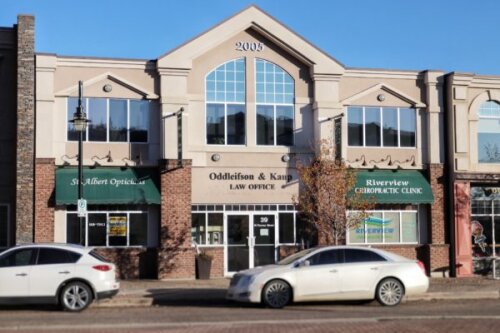Best Appeal Lawyers in St. Albert
Share your needs with us, get contacted by law firms.
Free. Takes 2 min.
List of the best lawyers in St. Albert, Canada
About Appeal Law in St. Albert, Canada
Appeal law in St. Albert, located in the province of Alberta, is the legal process by which individuals or parties seek to challenge and review decisions made by lower courts or administrative bodies. When a person believes a judicial or administrative ruling was made in error-whether due to an incorrect application of the law, procedural issues, or other concerns-they may file an appeal to have a higher court or tribunal reconsider the outcome. Appeal proceedings follow specific guidelines set by Alberta's court systems and can relate to various types of cases, such as criminal, civil, family, or administrative matters.
Why You May Need a Lawyer
Understanding and navigating the appeal process can be complex, requiring detailed knowledge of legal procedures and provincial law. It is common to seek legal representation when:
- You believe a court or tribunal made a legal or factual error in its decision.
- You feel your rights were not fully granted or protected in the original proceedings.
- Your initial case involved complicated evidence or unclear legal principles.
- You face strict deadlines for submitting an appeal, and need guidance to ensure all requirements are met.
- The other party to the case has already filed an appeal and you wish to defend the original decision.
- You need help preparing written arguments (“factums”) or oral submissions for appellate courts.
Consulting a lawyer ensures your case is presented effectively and your interests are protected throughout the appeal process.
Local Laws Overview
Appeals in St. Albert are governed by Alberta’s legal system, with specific procedures set out for different types of cases:
- Criminal Appeals: Usually brought before the Alberta Court of Appeal, which reviews Lower Court decisions for errors in law or procedure.
- Civil Appeals: Decisions from the Alberta Court of King’s Bench (formerly the Court of Queen’s Bench) or Provincial Court may be appealed to the next level court, subject to specific grounds and timelines.
- Family Law Appeals: Family law matters can often be appealed if a judge’s decision is in question, with particular attention to child custody, support, or division of property.
- Administrative Appeals: Decisions from local boards or tribunals (for example, related to property assessments or municipal issues) may be appealed through either statutory appeal rights or judicial review.
- Deadlines: Appeal time limits are typically short-often 30 days from the date of the original decision. Missing these deadlines can lead to loss of the right to appeal.
- Grounds for Appeal: Appeals are not a rehearing of the original matter. Instead, they focus on legal errors, misapplication of the law, or breaches of natural justice.
It is important to note that not all decisions are automatically appealable, and obtaining legal advice can clarify your options.
Frequently Asked Questions
What is an appeal?
An appeal is a legal process where a higher court or tribunal reviews the decision of a lower court or administrative body to determine if errors were made that affected the outcome.
Can anyone file an appeal?
Most parties to a case can file an appeal if they believe a legal or procedural error occurred, but strict deadlines and specific legal grounds must usually be met.
How long do I have to file an appeal?
Appeal periods are often very short, usually 30 days from the order or judgment date. Always confirm the timeline relevant to your specific matter, as missing the deadline can forfeit your right to appeal.
What kinds of decisions can be appealed in St. Albert?
Appealable decisions include court judgments in criminal, civil, and family matters, and some administrative rulings by municipal boards or tribunals.
What happens during an appeal?
The appellate court reviews the record of the original proceedings and written arguments. Oral submissions may also be required. New evidence is rarely permitted.
What outcomes are possible after an appeal?
The appeal court may uphold the original decision, reverse it, order a new trial, or change specific parts of the judgment.
Do I need a lawyer to file an appeal?
While you are not required to have a lawyer, the appeal process is technical. A lawyer can help you understand your legal grounds, prepare concise arguments, and avoid procedural errors.
How much will it cost to appeal?
Costs can vary widely based on complexity and the type of appeal. In addition to legal fees, there may be court filing fees and costs for preparing transcripts.
If I lose my appeal, what can I do?
Further appeals may be possible to a higher court, such as the Supreme Court of Canada, but only in cases meeting strict criteria. Legal advice is highly recommended.
Where are appeal hearings held in St. Albert?
Most appeals related to St. Albert are heard at Alberta courts located in Edmonton, such as the Alberta Court of Appeal or the Court of King’s Bench, depending on your case type.
Additional Resources
If you need legal advice or more information about appeals in St. Albert, the following resources may be helpful:
- Alberta Courts: Provides detailed information about court processes, court locations, and appeal procedures.
- Legal Aid Alberta: Offers free or low-cost legal advice and representation for eligible individuals.
- Law Society of Alberta: Directory of licensed lawyers and resources for public legal education.
- Edmonton Community Legal Centre: Offers assistance to low-income residents in the Edmonton area, including St. Albert.
- City of St. Albert: Information and contacts for municipal tribunals and boards that may issue appealable decisions.
Next Steps
If you are considering an appeal in St. Albert, follow these recommended steps:
- Review the Original Decision: Obtain a copy and carefully review the court or tribunal’s reasons for decision.
- Note Appeal Deadlines: Identify and diarize the last date you can file a notice of appeal.
- Consult a Lawyer: Seek professional legal advice to assess your chances of success and help prepare appeal materials.
- File a Notice of Appeal: Prepare and file the required documentation with the appropriate court within the deadline.
- Prepare for the Appeal Hearing: Work with your lawyer to compile your written submissions and any additional materials.
- Attend the Appeal Hearing: Be present and ready to respond to questions from the appellate judges, if oral argument is required.
Act quickly-deadlines for appeals are strict, and early advice improves your chances of a successful outcome. If you are unsure about your next move, contact a local legal professional experienced in appeals law for guidance.
Lawzana helps you find the best lawyers and law firms in St. Albert through a curated and pre-screened list of qualified legal professionals. Our platform offers rankings and detailed profiles of attorneys and law firms, allowing you to compare based on practice areas, including Appeal, experience, and client feedback.
Each profile includes a description of the firm's areas of practice, client reviews, team members and partners, year of establishment, spoken languages, office locations, contact information, social media presence, and any published articles or resources. Most firms on our platform speak English and are experienced in both local and international legal matters.
Get a quote from top-rated law firms in St. Albert, Canada — quickly, securely, and without unnecessary hassle.
Disclaimer:
The information provided on this page is for general informational purposes only and does not constitute legal advice. While we strive to ensure the accuracy and relevance of the content, legal information may change over time, and interpretations of the law can vary. You should always consult with a qualified legal professional for advice specific to your situation.
We disclaim all liability for actions taken or not taken based on the content of this page. If you believe any information is incorrect or outdated, please contact us, and we will review and update it where appropriate.










